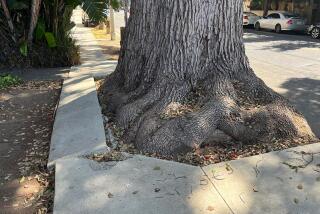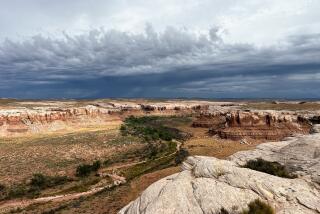Editorial: Congress needs to stop ignoring the repairs backlog at national parks
When household budgets are tight, people tend to put off expensive maintenance projects. So a leaky roof gets patched instead of replaced, or paint is left to peel for a season or two or three longer than a homeowner (not to mention the neighbors) would like.
Government agencies do the same thing. And now, after years of putting off less-crucial repairs because of insufficient funding, the National Park Service has an $11.5 billion backlog of deferred maintenance projects — about four times the department’s annual operating budget (and part of a $159 billion overall federal backlog). About half of the parks backlog involves roads and bridges, and the rest covers wastewater treatment plants, buildings, water systems, campgrounds and other facilities.
------------
FOR THE RECORD:
National Parks: A Jan. 25 editorial on deferred maintenance in national parks described Yosemite as the nation’s first national park. It was Yellowstone. —
------------
To leave these maintenance issues unresolved just sets the stage for more expensive fixes down the road.
That’s an astounding amount of work, and while it’s not as popular with park users as habitat restoration, it’s crucial for ensuring public safety and the quality of the parks themselves. Fortunately, Congress’s recent budget nearly doubles the money —to $116.3 million — for projects deemed by the Park Service to be critical for the well-being of visitors and workers, or for environmental restoration. The new five-year highway transportation bill also includes $1.4 billion for roads and bridges in national parks. While the increased spending is good news for the parks and those who visit them, it’s far less than what’s required to address the need.
Later this year, the National Park Service will celebrate its centennial, which marks more of a bureaucratic benchmark than a true birthday, since Yosemite was designated the world’s first national park in 1872. By early 1916, the nation had 14 national parks, 21 national monuments and two protected “reservations” at Hot Springs, Arkansas, as well as the Casa Grande ruins in Arizona. But the parks had no central administration, which led to inconsistent policies; in August of that year, the National Park Service was founded.
Hoping to capitalize on the centennial spotlight, the Obama administration has asked Congress to allocate $900 million more over three years to reduce the parks’ deferred maintenance backlog, and another $300 million over three years for restoration projects, making energy and water use more efficient and improving outdoor recreation facilities in parks as well as on land administered by the Bureau of Land Management, the Forest Service and other agencies. Neither of those proposals have gained traction with Republicans because they don’t include cuts to offset the new spending.
The Park Service also wants Congress to create a new National Park Centennial Challenge Fund which would match private donations for park projects with federal money, including but not limited to deferred maintenance. The concept of a public-private partnership has bipartisan support but, not surprisingly, there’s a gulf as wide as the Grand Canyon on funding. The administration proposes as much as $100 million over each of three years in matching funds. A Republican counter-proposal would bump the price of a lifetime senior pass from $10 to $80, the same price as a regular annual parks pass, with the new revenue going to the matching fund. Republicans also want to raise money for a new National Park Endowment with a 5% lodging fee on park guests. They estimate both fees would bring in as much as $37 million a year, which they argue should be the limit of the government’s contribution.
That’s quite a divide. But to leave these maintenance issues unresolved just sets the stage for more expensive fixes down the road. The backlog includes more than $500 million at Yosemite alone, some $100 million of which is considered critical (California’s national parks account for a total of $1.7 billion in deferred maintenance). While nonprofit conservancy groups have spent hundreds of millions of dollars on restoration, preservation, wildlife management and similar projects in national parks, they generally don’t address infrastructure issues.
We hope we aren’t misplacing our trust in the ability of Republicans and Democrats to compromise on this issue. Even in Washington, the city of eternal discord, there ought to be room for shared vision, and shared commitment, for a national park system that author Wallace Stegner once described as “the best idea we ever had.”
Follow the Opinion section on Twitter @latimesopinion and Facebook
More to Read
A cure for the common opinion
Get thought-provoking perspectives with our weekly newsletter.
You may occasionally receive promotional content from the Los Angeles Times.










